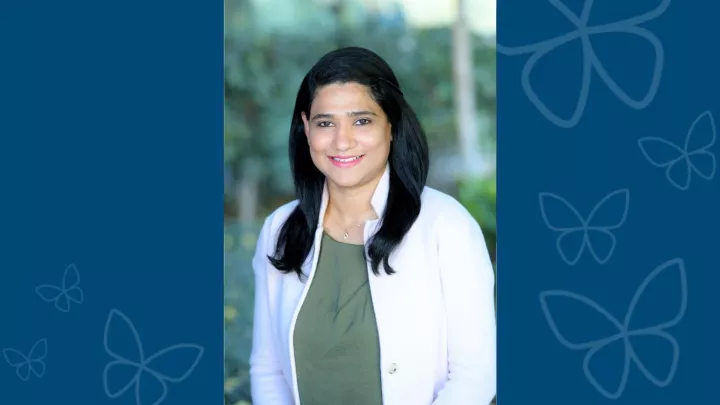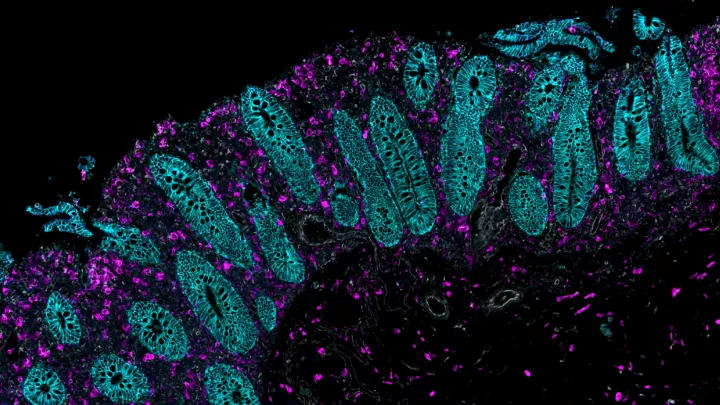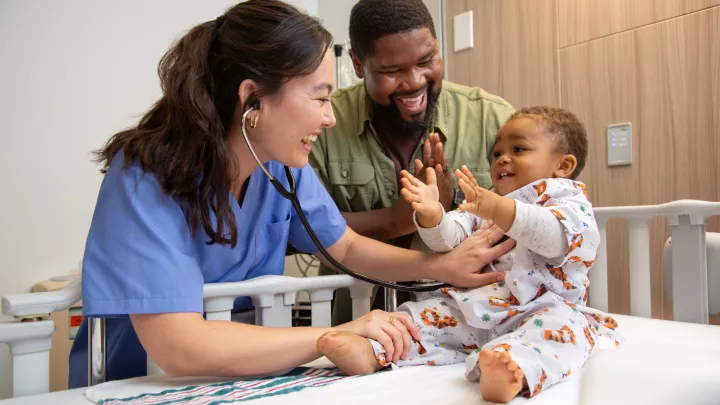Pancreas Program
The Pancreas Program at Children’s Hospital Los Angeles provides an organized, coordinated and efficient means of diagnosing and treating children with pancreatic disorders, as well as offering supportive care so patients have improved quality of life.
Pancreatic disorders include various conditions that affect the endocrine and digestive (exocrine) functions. The pancreas is a glandular organ in both systems, and it produces important hormones and secretes digestive enzymes that assist digestion and absorption of nutrients in the small intestine. Two common conditions we treat are acute pancreatitis and chronic pancreatitis.
Acute pancreatitis is when the pancreas becomes inflamed, which causes severe abdominal pain and often is treated in the hospital. Chronic pancreatitis is a progressive inflammation of the pancreas that causes abdominal pain and can lead to permanent damage of pancreatic tissue and permanent loss of the organ’s function.
Our multidisciplinary team offers comprehensive care for children suffering from pancreatic disorders and conditions.
The Children’s Hospital Los Angeles Difference
Children’s Hospital Los Angeles offers transformative care, advanced treatments and the compassion every child and their family deserves. Here are reasons why CHLA is your top choice, especially for complex conditions like pancreatitis:
- Expertise in Pediatric Pancreatitis: CHLA is one of the few hospitals in the nation with a dedicated Pancreas Program specializing in both acute and chronic pancreatitis in children.
- Cutting-Edge Treatment Options: Our team of experts use groundbreaking surgical techniques, including total pancreatectomy with islet auto transplantation (TPIAT) for chronic pancreatitis. CHLA was the first children’s hospital in Southern California to perform this procedure and remains one of only two on the West Coast and among only a few in the nation to offer it.
- Comprehensive Care: Your child’s care will include experts like gastroenterologists, surgeons, endocrinologist, dietitians, and pain management specialists who work together to create personalized treatment plans. We make sure every aspect of care is addressed—from diagnosis to recovery.
- Focused on Pain Relief and Healing: We understand how challenging pancreatitis can be. That’s why we offer leading-edge pain management solutions and enzyme therapy to help children manage their symptoms and heal more comfortably.
- A Leader in Pediatric Medicine: Our commitment to research means we are always searching for better ways to treat and cure complex conditions, giving your child access to the latest and most effective treatments.
Commonly Treated Disorders
- Acute recurrent pancreatitis (ARP) and chronic pancreatitis (CP)
- Autoimmune pancreatitis
- Hereditary pancreatitis
- Congenital pancreatic abnormalities including:
- Annular pancreas
- Pancreas divisum
- Pancreatic cysts and pseudocysts
- Ampullary obstruction
- Anomalous biliopancreatic junction (union)
- Pancreatic exocrine insufficiency (EPI)
- Pancreatic trauma
- Pancreatic tumors
Treatment and Support Services We Offer
It takes a multidisciplinary approach to support children with pancreatic disorders. Often, treatment involves supportive care. For conditions like pancreatitis, there is no single medication or treatment that will help the pancreas to recover. Patients who have abdominal pain can be treated with pain medications. Nausea and vomiting are treated with anti-nausea medications. Anatomic abnormalities may require advanced endoscopic procedures. However, not all patients will need intervention procedures or surgery.
Our program offers multidisciplinary assessment and treatment, such as:
- Pain management team for chronic abdominal pain.
- Dietician to assess nutrition status and micronutrient deficiency.
- Special advanced endoscopic procedures known as ERCP, and endoscopic ultrasound.
- Endoscopic Pancreatic Function Test (EPFT) to assess early pancreatic digestive function.
- Pancreatic surgery and supportive medical treatments, including total pancreatectomy with islet autotransplantation (TPIAT) for chronic pancreatitis.
Clinical Trials and Research
INSPPIRE 2 study (International Study Group of Pediatric Pancreatitis: In search for a cure)
Acute pancreatitis (AP) was once considered an uncommon disease of childhood. In recent years, the number of children with AP has increased to an annual incidence approaching that of adults. Despite modest incidence rates, Acute Recurrent Pancreatitis (ARP) and Chronic Pancreatitis (CP) are associated with significant disease burden. The risk factors that predispose children to recurrent attacks of AP, then progression from ARP to CP and finally to exocrine and endocrine pancreatic insufficiency are not fully understood. The international INSPPIRE 2 Consortium was formed to systematically characterize ARP and CP in children and address the knowledge gap in pediatric pancreatitis. We plan to overcome these barriers using the collective expertise, data, and samples provided by all collaborating sites.
Biliary Dyskinesia
Biliary Dyskinesia is a motility disorder that affects the gallbladder and sphincter of Oddi. Patients with this condition present with biliary-type pain, and investigations show no evidence of gallstones in the gallbladder. Collaborating with surgical team, the purpose of this study is to describe the current population of pediatric patients undergoing cholecystectomy for biliary dyskinesia and help construct a predictive model.
The Pediatric ERCP Database Initiative (PEDI)
Doctors are increasingly using ERCP (endoscopic retrograde cholangiopancreatography) to treat children, but clear guidelines tailored for kids are lacking. This forces endoscopists performing ERCP in children to adapt adult guidelines and recommendations to the pediatric patient, which is not always appropriate. This project proposes the creation of a collaborative consisting of endoscopists performing ERCP in children to develop pediatric-specific guidelines and track outcomes. This proposal seeks to create a database of children undergoing ERCP to define the best reasons for using the procedure and to improve results. This effort also includes a sub-study to develop an algorithm that may be used in the management of common bile duct stones (CBDS) in children. This sub-study will use lab tests and imaging to identify risks and provide safer, more effective care.
Explore our research and clinical trials.


